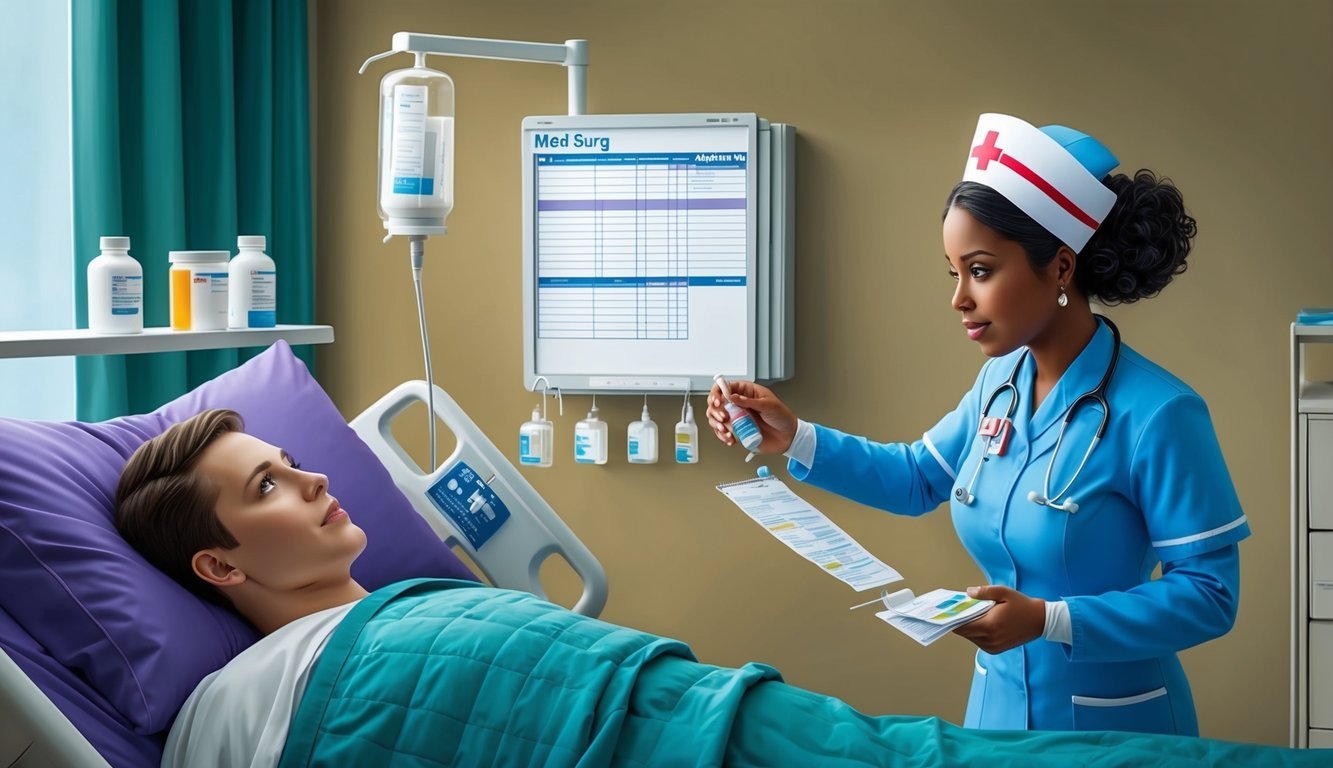Medical-surgical nursing is a vital area of healthcare that focuses on providing care for adults with various medical conditions, including those recovering from surgery. As a med-surg nurse, you play a key role in patient care, ensuring the comfort and well-being of individuals during their hospital stay.
Your work requires a blend of skills, from monitoring patients to collaborating with doctors and other healthcare team members.
To become a med-surg nurse, you typically need to start as a registered nurse and gain specific experience in medical-surgical settings.
This specialty allows you to handle a diverse range of cases, making your job both challenging and rewarding.
Your responsibilities include assessing patient conditions, implementing care plans, and providing emotional support to patients and their families.
The future of med-surg nursing is bright, with many opportunities for career advancement and specialization.
As healthcare continues to evolve, specialized training and certifications can enhance your skills and open doors to new roles within this essential field.
Key Takeaways
- Med-surg nurses provide essential care to adult patients with diverse medical issues.
- You can advance your career through specialized training and certifications.
- The field continues to grow, offering many opportunities for specialized roles.
Pathways to Becoming a Med-Surg Nurse
Becoming a Med-Surg nurse involves gaining the right education, certification, and specialized training.
You must meet specific requirements and pursue opportunities that will enhance your knowledge and skills in this field.
Essential Education
To start your journey, you need a solid educational foundation.
Most Med-Surg nurses hold at least an Associate Degree in Nursing (ADN) or a Bachelor of Science in Nursing (BSN).
Here’s a quick comparison of the two:
| Degree Type | Duration | Key Focus |
|---|---|---|
| Associate Degree (ADN) | 2 years | Basic nursing skills and clinical practice |
| Bachelor’s Degree (BSN) | 4 years | Comprehensive nursing education with leadership and community health |
After completing your degree, you must pass the NCLEX-RN exam to become a licensed registered nurse (RN).
Attending an accredited nursing program is crucial for both obtaining your degree and satisfying exam eligibility.
Certifications for Professional Development
Certification enhances your credibility and opens up career advancement opportunities.
After obtaining your RN license, you can pursue the Medical-Surgical Nursing Certification (CMSRN) through the Medical-Surgical Nursing Certification Board (MSNCB).
To qualify for this certification, you must meet specific clinical experience requirements, which usually include at least two years of practice in medical-surgical nursing.
Continuing education is essential to maintain your certification and can be achieved through various online RN-to-BSN programs or specialty courses.
Considerations for certifications:
- CMSRN: Validates your expertise in Med-Surg nursing.
- Nursing Certification: Shows commitment to professional growth.
Specialization in Medical-Surgical Nursing
To specialize in this field, you should seek opportunities that allow you to focus on medical-surgical patients.
Gaining hands-on experience in various healthcare settings, such as hospitals and clinics, will be beneficial.
Participating in specialty workshops or seminars can provide invaluable skills.
Join organizations like the Academy of Medical-Surgical Nurses (AMSN) to access continuing education and networking opportunities.
Commit to lifelong learning to stay updated on best practices and advancements in Med-Surg nursing.
This commitment can significantly impact your career and the quality of care you provide.
Key Responsibilities and Skills

As a med-surg nurse, you play a crucial role in patient care.
Your responsibilities include providing clinical support, coordinating care, and effectively communicating with both patients and healthcare teams.
Here are the key areas of focus.
Medical and Surgical Care
In medical and surgical care, you must perform vital tasks that ensure patient safety and recovery.
These include:
-
Patient Assessment: You evaluate patient conditions through physical exams and reviews of medical histories.
-
Medication Administration: You administer medications accurately, monitoring for side effects and managing any adverse reactions.
-
Wound Care: You handle dressings and wound cleansings, ensuring proper healing processes.
-
Monitoring Vital Signs: Regular checks of blood pressure, heart rate, and temperature are essential for tracking patient status.
-
Documentation: Accurate record-keeping is vital for legal reasons and continuity of care.
Familiarity with medical equipment is also important in this specialty.
Managing Patient Care
Managing patient care involves coordinating activities to ensure patients receive comprehensive support.
You should:
-
Communicate Effectively: Clear communication with patients and their families helps to establish trust and understanding.
-
Care Coordination: You work closely with multidisciplinary teams to streamline treatments and organize follow-ups.
-
Attention to Detail: Small lapses can have serious consequences in patient care, so being meticulous is crucial.
Creating a structured care plan based on assessment findings guides your clinical decisions.
Developing Critical Thinking and Communication
Critical thinking is key in making informed decisions.
You need to:
-
Solve Problems: Assess situations quickly, especially during emergencies, to provide immediate interventions.
-
Demonstrate Compassion: Empathy plays a strong role in patient interactions, helping to ease fears and provide comfort.
-
Organizational Skills and Time Management: Balancing multiple tasks efficiently is essential in fast-paced environments.
Enhancing communication skills helps in effectively conveying important information to patients and medical teams.
Access to resources like patient education tools can improve your effectiveness.
Clinical Practice and Specializations
In medical-surgical nursing, you will manage a variety of patient needs, from acute to chronic conditions.
This role requires specialized skills and knowledge across different subspecialties.
Acute and Chronic Patient Management
In acute care settings, you will work with patients who have serious conditions requiring close monitoring and quick intervention.
Surgical patients may need assistance recovering from anesthesia and managing pain after procedures.
For chronic conditions like diabetes, COPD, or orthopedic issues, your focus shifts to long-term management strategies.
You play a vital role in educating patients about treatment plans and lifestyle changes.
This could include medication management, dietary adjustments, and exercise recommendations.
Effective pain management is essential in both acute and chronic scenarios.
You will assess pain levels and implement appropriate interventions to improve patient comfort and recovery outcomes.
Strong communication skills are crucial to understand each patient’s unique needs.
Subspecialties within Med-Surg Nursing
Med-surg nursing includes various subspecialties, allowing you to focus on specific areas of interest.
Common subspecialties include:
- Oncology: Caring for cancer patients requires knowledge of complex treatment regimens and emotional support.
- Orthopedics: Here, you will manage patients recovering from surgery or dealing with chronic musculoskeletal issues.
- COPD: This specialization focuses on managing breathing difficulties and improving patients’ quality of life through education and treatment.
Each subspecialty demands a unique skill set and understanding of patient care protocols.
This diversity allows you to tailor your practice to meet specific patient needs and establish expertise in your chosen area.
For more information on these specializations, consider visiting Nursing Education.
Career Advancement Opportunities
As a medical-surgical nurse, there are various paths available for career advancement.
You can explore new roles, specializations, and certifications that can enhance your skills and open doors for professional growth.
Roles and Positions for Career Growth
Several positions can help you progress in your nursing career.
Here are some options:
| Position | Description |
|---|---|
| Clinical Nurse Specialist | This role involves specialized clinical knowledge and advanced practice to improve patient care and outcomes. |
| Nurse Educator | As an educator, you teach aspiring nurses and help them develop essential skills. This role can be rewarding and expand your influence in the field. |
| Certified Medical-Surgical Registered Nurse (CMSRN) | Earning this certification demonstrates your expertise in the med-surg specialty and opens up leadership positions. |
| Certified in Care Coordination and Transition Management (CCCTM) | This certification focuses on managing patient care transitions, allowing you to work closely with patients and their families. |
These roles often come with increased responsibilities and higher salaries.
Continuing Education and Training
Ongoing education is crucial for your career advancement.
Consider these options:
- Master of Science in Nursing (MSN): Pursuing an MSN can qualify you for advanced practice roles and leadership positions.
- Specialized Certifications: Apart from CMSRN, you can obtain certifications in areas like critical care or nurse leadership, enhancing your qualifications.
- Workshops and Seminars: Attending workshops on topics such as nursing education or patient care can help you gain new skills and insights.
- Professional Associations: Joining organizations like the Academy of Medical-Surgical Nurses (AMSN) can provide networking opportunities and access to valuable resources.
Investing in your education enables you to stay current and advance in your nursing career.
The Future of Med-Surg Nursing

As a med-surg nurse, you’ll be navigating an evolving landscape shaped by advancements in healthcare practices and the growing demand for skilled nursing professionals.
Keeping abreast of these changes is crucial for your career development and patient care.
Advancements in Healthcare Practice
The medical-surgical specialty is seeing rapid advancements that influence how care is delivered.
New technologies, such as electronic health records (EHR) and telehealth, are transforming patient interactions.
These tools enhance communication, making it easier for you to coordinate care and monitor patient outcomes.
Furthermore, a greater emphasis on evidence-based practice (EBP) is improving patient safety.
You will use data and research to guide clinical decisions, leading to better health outcomes for adult patients.
This shift is not just about adopting new tools but also about continuous education and training to develop your skills in these areas.
Job Outlook and Demand
The job outlook for med-surg nursing is strong, with increasing demand for skilled nurses in healthcare facilities.
As the population ages and health issues become more complex, the need for medical-surgical nurses will rise.
The Bureau of Labor Statistics projects a favorable growth rate for nursing careers, particularly in roles that specialize in adult patient care.
Many hospitals prioritize hiring certified nurses, particularly those with the Certified Medical-Surgical Registered Nurse (CMSRN) designation.
This certification proves your competency and understanding of best practices in patient care, enhancing your employability.
Additionally, the rise in home health care settings provides even more opportunities for med-surg nurses to deliver high-quality care outside traditional hospital environments.
| Factor | Impact |
|---|---|
| Advancements | Improved patient monitoring and safety |
| Demand | Increasing job opportunities |
| Specialization | Emphasis on CMSRN certification |
Frequently Asked Questions
In this section, you will find important information about becoming a med-surg nurse, including educational and certification requirements, salary comparisons, key responsibilities, types of patients cared for, job opportunities, and how this specialty stands out from others.
What are the educational and certification requirements for a med-surg nurse?
To become a med-surg nurse, you need a nursing degree.
You can earn either an Associate Degree in Nursing (ADN) or a Bachelor of Science in Nursing (BSN).
After completing your degree, you must pass the NCLEX-RN exam to become a licensed registered nurse.
Certification is not mandatory but is highly recommended.
It can enhance your understanding and career prospects.
Common certifications include the Medical-Surgical Nursing Certification (CMSRN) and the Board Certified Medical-Surgical Nurse (MEDSURG-BC).
These certifications require meeting specific educational and work experience criteria.
How does the salary of a med-surg nurse compare to other nursing specialties?
The salary of a med-surg nurse can vary based on location, experience, and healthcare facility.
On average, a med-surg nurse earns between $60,000 and $80,000 per year.
This is generally competitive compared to other nursing specialties.
For example, critical care nurses tend to earn slightly higher salaries, while entry-level nursing positions may offer lower pay.
You can often check salary information through resources like the Bureau of Labor Statistics.
What are the primary duties and responsibilities of a med-surg nurse?
Med-surg nurses are responsible for providing care to patients with various medical conditions.
Their duties include monitoring vital signs, administering medications, and assisting with procedures.
You will also educate patients and their families about care plans.
Documentation is another critical responsibility.
You will need to accurately record patient information and communicate with the healthcare team to ensure effective care.
What types of patients typically require med-surg nursing care?
Med-surg nurses care for a wide range of patients.
These can include individuals recovering from surgery, those with chronic illnesses, and patients experiencing acute medical conditions.
Common issues include respiratory infections, heart conditions, and gastrointestinal problems.
The diversity of patient needs makes medical-surgical nursing a versatile specialty.
How can one find job opportunities within the med-surg nursing field?
To find job opportunities in med-surg nursing, you can start by checking hospital websites and nursing job boards.
Networking with other nurses and attending nursing conferences can also be beneficial.
Additionally, consider using platforms like Indeed or Glassdoor to search for positions.
Tailoring your resume and cover letter to highlight your med-surg skills is important.
What distinguishes medical-surgical nursing from other nursing specialties?
Medical-surgical nursing is unique because it combines care for patients with both medical and surgical conditions.
Unlike specialties like pediatrics or critical care, med-surg nurses often work with patients across various health issues.
This specialty requires adaptability and a broad knowledge base.
It makes a great foundation for further nursing education and specialties.
Med-surg nursing is also seen as a stepping stone for nurses looking to advance their careers.

